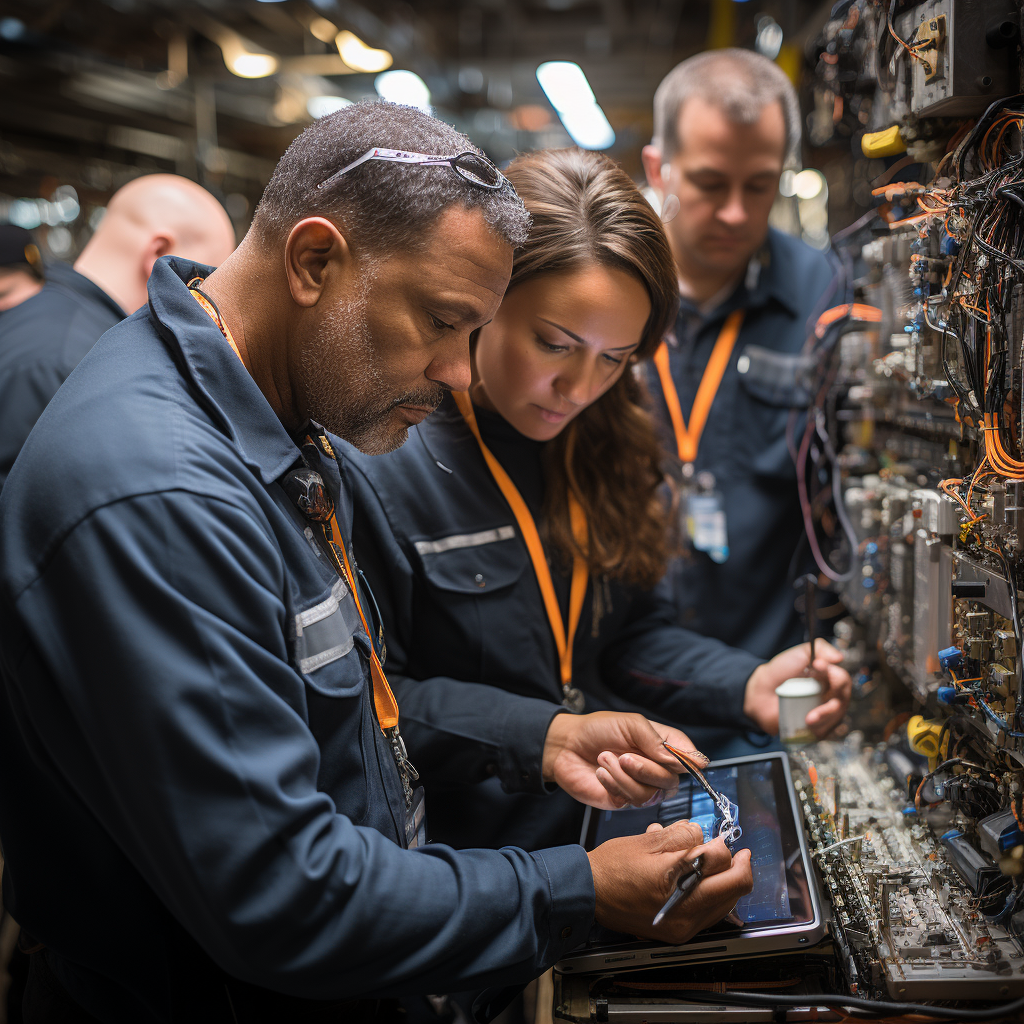Field service support is a comprehensive approach to providing technical assistance and support for products or services in the field. It is also referred to as on-site support. This includes activities like installation, maintenance, repair, and troubleshooting of equipment or systems at customer sites. Field service support is crucial in various industries such as manufacturing, telecommunications, healthcare, and information technology. It ensures that products or services are functioning optimally and meeting customer needs.
A team of trained and skilled technicians is responsible for providing on-site support as part of field service support. These technicians have the necessary tools, knowledge, and expertise to handle any issues that may arise in the field. They act as a liaison between customers and the company, promptly addressing customer concerns or complaints. This not only improves customer satisfaction but also strengthens the relationship between the company and its customers.
Content:
- From Paper to Pixels: How Technology is Revolutionizing Field Service Support
- The Tech Touch: How Innovation is Transforming Field Service Support
- Field Service 2.0: The Role of Technology in Revolutionizing Support
- Smart Tools for Field Warriors: The Rise of New Technologies in Field Service Support
- Redefining the Game: How Technology and Innovation are Changing Field Service Support
Field service support goes beyond technical assistance. It may also involve providing training to customers on how to effectively use products or services, conducting regular maintenance checks, and offering recommendations for system upgrades or improvements. This helps companies stay ahead of potential issues and continuously enhance their offerings.
In today’s fast-paced and competitive market, field service support is essential in ensuring customer satisfaction. Through on-site technical assistance and support, companies can effectively meet customer needs. In this document, we will delve deeper into the concept of field service support, discussing its significance, benefits, and best practices for successful implementation. Let’s explore the world of field service support together!
From Paper to Pixels: How Technology is Revolutionizing Field Service Support
Over the years, field service support has undergone a profound transformation. Gone are the days of carrying around stacks of paperwork and relying on manual processes. Technology has emerged as a game-changer, revolutionizing the way field service support is delivered.
With the advent of mobile devices, technicians now have access to a wealth of information at their fingertips. From scheduling appointments to accessing customer data and troubleshooting guides, everything can be done right from the palm of their hand. This not only improves efficiency but also enhances the customer experience.
Moreover, the integration of cloud technology has further accelerated this revolution. Technicians can now store and access data in real-time, no matter where they are. This enables seamless collaboration between team members and reduces the chances of miscommunication or duplication of work.
Another significant advancement is the use of IoT (Internet of Things) devices in field service support. These devices are embedded with sensors that can monitor equipment performance, detect issues before they become major problems, and even automatically schedule maintenance or repairs. This proactive approach ensures that downtime is minimized, leading to increased customer satisfaction and cost savings for businesses.
The role of artificial intelligence (AI) cannot be overlooked in this revolution. AI-powered chatbots can now handle routine customer queries, freeing up human resources to focus on more complex issues. This results in faster response times and improved first-time resolution rates.
In conclusion, technology has transformed field service support from a time-consuming, paper-reliant process to a streamlined, digitized operation. With the integration of mobile devices, cloud technology, IoT devices, and AI, technicians now have the tools they need to deliver efficient and effective support to customers. The future of field service support is undoubtedly digital, and organizations that embrace these innovative technologies will stay ahead of the game.
The Tech Touch: How Innovation is Transforming Field Service Support
Innovation has become the driving force behind the transformation of field service support. Technology has revolutionized the way technicians operate, enabling them to provide faster, more efficient service to customers.
One of the most significant advancements in field service support is the use of mobile applications. These applications allow technicians to receive real-time updates on tasks, access troubleshooting guides, and communicate with customers and colleagues. This instant access to information eliminates the need for technicians to return to the office for instructions or support, saving time and improving overall productivity.
Additionally, the emergence of augmented reality (AR) and virtual reality (VR) has brought about a paradigm shift in field service support. Technicians can now utilize these technologies to receive remote guidance from experts, visualize complex repair procedures, or even train themselves on new equipment. This not only improves efficiency but also reduces the need for costly and time-consuming on-site visits.
Internet of Things (IoT) devices have also played a transformative role in field service support. These devices can be installed on equipment to monitor performance, detect faults, and even trigger automated maintenance or repair tasks. This proactive approach not only helps prevent breakdowns but also ensures that issues are addressed before they impact customer operations.
Furthermore, the integration of artificial intelligence (AI) and machine learning has revolutionized service delivery. AI-powered chatbots can handle routine customer queries, reducing the workload on technicians and improving response times. Machine learning algorithms can analyze vast amounts of data to identify patterns and provide predictive insights, enabling technicians to take proactive measures to prevent issues.
In conclusion, innovation has brought about a significant transformation in field service support. The use of mobile applications, AR/VR, IoT devices, and AI has revolutionized the way technicians operate, resulting in faster response times, improved customer satisfaction, and enhanced efficiency. As technology continues to evolve, the future of field service support looks promising, with even more exciting advancements on the horizon.
Field Service 2.0: The Role of Technology in Revolutionizing Support
Technology has become a driving force in revolutionizing field service support, leading to the emergence of what can be called “Field Service 2.0.” This new era is characterized by the transformative role of technology in improving support processes and outcomes.
One of the key aspects of Field Service 2.0 is the use of mobile technology. Technicians armed with smartphones or tablets have access to a myriad of tools and information at their fingertips. Through mobile applications, they can receive real-time updates, access manuals and documentation, and communicate seamlessly with their teams and customers. This enhanced connectivity improves response times and enables faster problem-solving, resulting in increased customer satisfaction.
Cloud technology is another game-changer in Field Service 2.0. By storing data in the cloud, technicians can access crucial information regardless of their location. Field service management systems can leverage cloud technology to optimize scheduling and dispatching, ensuring that the right technician with the right skills is sent to the job promptly. Moreover, cloud-based collaboration tools allow teams to work together seamlessly, sharing knowledge and expertise for more efficient problem-solving.
The rise of Internet of Things (IoT) devices has had a profound impact on field service support. Connected devices embedded with sensors can monitor equipment performance, proactively identify maintenance needs, and even trigger automated repair actions. This shift from reactive to proactive maintenance reduces downtime, enhances equipment lifespan, and improves overall operational efficiency.
Artificial intelligence (AI) and machine learning are also central to the transformation of Field Service 2.0. AI-powered chatbots can handle routine customer queries, freeing up human agents to focus on more complex issues. Machine learning algorithms can analyze historical and real-time data to identify patterns and predict failures, enabling technicians to take preventive measures before breakdowns occur.
In conclusion, Field Service 2.0 is empowered by a range of technologies that revolutionize support processes. Mobile technology, cloud computing, IoT devices, and AI-driven automation all contribute to more efficient and effective field service support. As organizations embrace these technological advancements, they are well-equipped to provide seamless service experiences in an increasingly digital world.
Smart Tools for Field Warriors: The Rise of New Technologies in Field Service Support
Field service support has evolved dramatically with the adoption of new technologies, paving the way for a new era of “smart tools” that enhance the capabilities of field warriors. These tools leverage cutting-edge technologies to streamline operations, improve productivity, and deliver exceptional customer service.
One of the key innovations in field service support is the use of mobile applications. With smartphones and tablets in hand, field technicians can access a range of applications that empower them to work more efficiently. From receiving real-time notifications and updates to accessing product manuals and troubleshooting guides, these applications provide technicians with the information they need to resolve issues swiftly and accurately.
Internet of Things (IoT) devices have also made considerable strides in field service support. These smart devices can monitor equipment in real-time, collecting data on performance, utilization, and maintenance needs. By analyzing this data, technicians can proactively identify potential issues, optimize maintenance schedules, and even trigger automatic repair actions. This preventative approach not only minimizes downtime but also improves the lifespan of equipment.
Augmented reality (AR) has emerged as a game-changing technology for field warriors. Technicians equipped with AR-enabled devices can access overlays of digital information directly on the physical equipment they are working on. This allows for real-time guidance, remote collaboration with experts, and virtual training on complex procedures. AR enhances efficiency, minimizes errors, and reduces the need for additional support, ultimately improving overall service outcomes.
Machine learning and artificial intelligence (AI) are further revolutionizing field service support. AI-powered chatbots can handle routine customer inquiries, providing instant responses and freeing up technicians to focus on more complex tasks. Machine learning algorithms can analyze vast amounts of data to identify patterns and trends, enabling predictive maintenance that prevents future breakdowns and optimizes resource allocation.
In conclusion, the rise of new technologies has equipped field warriors with smart tools that redefine the capabilities of field service support. Mobile applications, IoT devices, AR, and AI-driven solutions enable technicians to work smarter, faster, and with increased precision. By leveraging these technologies, organizations can elevate their field service operations, deliver superior customer experiences, and stay ahead of the competition.
Redefining the Game: How Technology and Innovation are Changing Field Service Support
In the realm of field service support, technology and innovation have become catalysts for change, completely transforming traditional practices. From streamlining processes to enhancing customer experiences, technology is redefining the game and propelling into a new era.
One of the notable impacts of technology on is the utilization of mobility. With the proliferation of smartphones and tablets, technicians now have instant access to critical information and tools. Through mobile applications, they can access work orders, customer history, product manuals, and even collaborate with team members, all on the go. This level of connectivity enables technicians to be more responsive, efficient, and productive, ultimately leading to improved customer satisfaction.
Furthermore, the integration of cloud computing has revolutionized field service support in terms of accessing and sharing information. With data securely stored in the cloud, technicians can retrieve real-time updates, share best practices, and collaborate with colleagues in real-time, regardless of their physical location. This not only streamlines communication but also ensures that technicians have the most up-to-date information and resources at their disposal.
The advent of Internet of Things (IoT) devices has brought about a paradigm shift in field service support. Connected devices equipped with sensors can relay valuable information on equipment performance, detecting faults or anomalies before they escalate. This real-time data allows technicians to take proactive measures, addressing issues promptly, minimizing downtime, and maximizing equipment reliability.
Artificial intelligence (AI) and machine learning are also key players in redefining. AI-powered chatbots can handle routine customer inquiries, providing instant responses and freeing up human resources for more complex issues. Machine learning algorithms can analyze large datasets, uncover patterns, and provide predictive insights, empowering technicians to make data-driven decisions, optimize workflows, and deliver enhanced service quality.
In conclusion, technology and innovation have reshaped, propelling it into a new era. With the advancements in mobility, cloud computing, IoT devices, and AI applications, technicians can deliver faster, more efficient, and customized support to customers. Embracing these transformative technologies allows organizations to stay at the forefront of the field service industry while maintaining a competitive edge.



